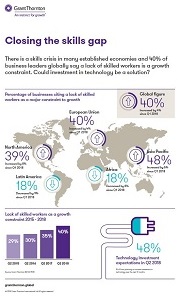
There may be a storm brewing in some of the world's largest economies as businesses come to terms with a skilled worker shortage. Technology and mobility are two options for businesses struggling to find talent.
In Canada, the US, UK, Japan and many other established economies, there is a deepening crisis in labour shortage. Businesses are increasingly struggling to attract the talent required to grow. According to Grant Thornton's International Business Report, 40% of business leaders around the world cited a lack of skilled workers as a growth constraint. In the US, skills concerns saw an 8pp increase to their highest level ever at 38%. In China, concerns also rose 8pp, to 38%. And in Germany, there was a leap of 25pp to 74% in Q2 2018.
In many markets there isn't a lot of excess capacity in the workplace. Economies are approaching full employment, so we're starting to see skills gaps reappear as well as the emergence of new ones. Worldwide unemployment has fallen to 5.2%, the lowest level seen in almost 40 years, owing to factors such as lower wages and the gig economy. While the global skills gap is expected to worsen, it's already having an impact on businesses. Some are unable to grow because they cannot increase the volume of skills they need to expand capacity to produce more goods or services.
Several factors are driving this trend, including an ageing population and declining work-age populations in some countries. Meanwhile, rapidly advancing technology is putting businesses under increasing pressure to acquire the advanced digital skills required to support developments such as artificial intelligence (AI), automation and blockchain technology.

See how your region views the skills shortage (PDF) [ 280 kb ]
Ironically, technology is both a cause and – and at least partially – a solution to the skills gap. The high demand for tech skills is a symptom of what technology can do for businesses. As the demand for skills rises so does investment in innovation and new business solutions. In Germany, for example, expectations for tech investment have increased by 5pp to 49%.
Technology is limiting the impact of skills shortages across most business functions including finance, accounting, and marketing and in the manufacturing and logistics sectors. The additional benefit is that while automation and technology remove some of the more basic tasks, existing employees have more capacity to add value in areas where machines can't.
However, for organisations considering digital processes as a response to issues such as skills shortages, the speed of deployment and return on investment is key.
While businesses can deploy technology to fill and support specific roles needed today, over the long-term they need an approach that is fully adaptable to emerging technology and its impact on skills.
Many businesses are increasingly turning to international workers where much-needed skills are hard to come by locally.
AURAY Sourcing, a subsidiary of Raymond Chabot Grant Thornton, was set up to provide a turnkey solution to support Canadian businesses in their recruiting and employee mobility needs, thereby addressing their specialised labour shortage.
Canada is currently attractive to overseas workers. Businesses in Quebec, for example, are sourcing skills notably from French speaking countries as well from countries in Asia, Latin America and eastern Europe and see worker mobility as a valuable means of sustainable production and commercial activities.
However, recruiting in a different country is not without its challenges.
Using a worldwide network of recruiters, AURAY Sourcing focuses on the skills that are most needed locally and are therefore those whose visa applications have the best chance of being approved. But it is a lengthy procedure, and although there is a fast track for some skills, it can take up to eight months for a company that is unfamiliar with the process of recruiting overseas.
Growing businesses are looking for an end-to-end solution that manages recruitment and relocation, all the way through to integration.
While new solutions can be sought to meet demand, learning and development programmes remain critical to skills strategies, particularly as employees recognise the need for life-long learning and keeping their skills relevant.
People, processes and technology are the three areas that drive an organisation. If you align the decisions that are made around technology to your strategy, you'll make better business decisions. Harnessing technology to develop your skills strategy, to educate existing employees and to find new sources of talent, will together help to address the skills deficit.